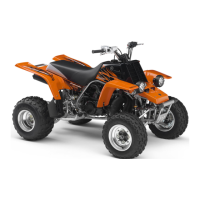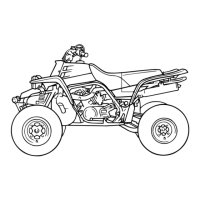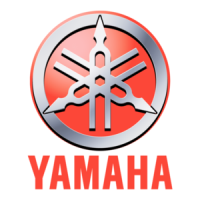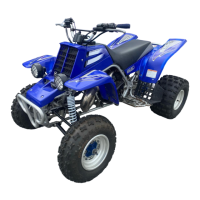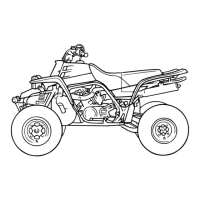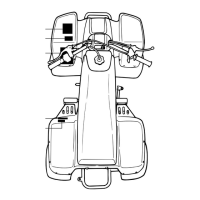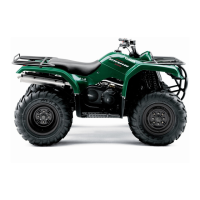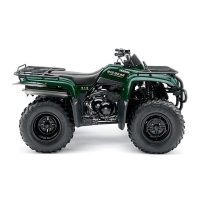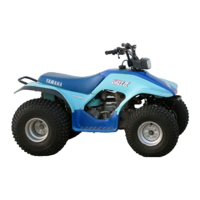Do you have a question about the Yamaha BANSHEE YFZ350P and is the answer not in the manual?
Key safety warnings and recommendations for ATV operation.
Explains the meaning of WARNING, CAUTION, and NOTE symbols.
Machine is for off-road use only; check local laws before operating.
Identifies the location and importance of all labels on the machine.
ATV handling differs from other vehicles; risk of collision/rollover exists.
Specifies age restrictions and supervision requirements for young operators.
Guidelines for safe operation including attire, speed, and terrain.
Advice for controlling the ATV on challenging surfaces.
Proper techniques for safely navigating inclines.
What to do if the ATV stalls or rolls backward while climbing.
Precautions for riding through water and checking brakes afterward.
Importance of correct tires, pressure, and avoiding modifications.
Guidelines for safe loading and increased braking distance.
Reiterates the importance of pre-operation checks for safety.
Emphasizes using correct tires and maintaining proper tire pressure.
Cautionary advice for operating the ATV with added loads or accessories.
Importance of keeping feet on footboards and hands on handlebars.
Discourages performing stunts like wheelies and jumps due to accident risk.
Warnings about improper modifications and accessory installation.
Warning about the hot exhaust system and fire risks.
ATV is for off-road use; paved surfaces affect handling and control.
Prohibition of riding on public roads due to collision risks.
Importance of knowing terrain and being alert to hazards in unfamiliar areas.
Caution required for operating on challenging terrain types.
Advice on increasing visibility with caution flags in low-visibility areas.
Suggests a safe area for practice and warns about hot engine/exhaust parts.
Prohibits operating the ATV under the influence of alcohol or drugs.
States that passengers are prohibited and explains why.
Lists essential protective gear including helmet, goggles, gloves, and clothing.
Reinforces the age limit and supervision requirements for young riders.
Spaces for recording key, vehicle, and model identification numbers.
Location of the key identification number for ordering new keys.
Location of the vehicle identification number stamped into the frame.
Location of the model label for spare parts ordering.
Explains the functions of the ON and OFF positions of the main switch.
Details the operation of the lights switch and engine stop switch.
Function of the engine stop switch for normal and emergency use.
How the throttle lever controls engine speed and the importance of checking its operation.
Function of the T.O.R.S. system and precautions if it activates.
How the speed limiter adjusts engine power and top speed.
Warnings and precautions regarding improper speed limiter and throttle adjustment.
How to use the clutch lever for engaging/disengaging the clutch.
How to operate the front brake lever.
How to operate the rear brake pedal.
When and how to use the parking brake, and its limitations.
Precautions for proper use of the parking brake to prevent accidents.
How to use the 6-speed transmission shift pedal.
Procedure for starting the engine using the kick starter.
How to remove and install the fuel tank cap.
Explains the OFF, ON, and RES positions of the fuel cock.
How to use the starter (choke) for cold engine starting.
Steps for removing and installing the ATV seat.
How to adjust the spring preload on the front shock absorber.
How to adjust the spring preload on the rear shock absorber.
Details spring length adjustments and required tightening torque.
How to adjust the rebound damping force of the shock absorbers.
How to adjust the compression damping force of the shock absorbers.
Caution regarding touching hot suspension components.
Comprehensive list of items to check before riding the ATV.
Emphasizes the risks of not performing pre-operation checks and maintenance.
How to check the brake levers, pedals, and their free play.
Checking brake fluid level and for leaks in the system.
Testing brake effectiveness at slow speeds after starting.
Importance of daily brake checks to prevent accidents.
Specifies recommended fuel type, octane, and tank capacity.
Safety precautions during refueling to prevent fire and injury.
How to check the transmission oil level and type.
Checking the drive chain's condition and slack.
Verifying the throttle lever operates smoothly and returns to idle.
Importance of checking chassis fittings and fasteners for tightness.
Verifying headlight and taillight functionality.
Checking the operation of various switches.
Lists approved tires and their recommended inflation pressures.
Minimum pressures and maximum pressures for seating tire beads.
Recommended, minimum, and maximum tire pressures.
Specifies the minimum tire groove depth before replacement.
Warnings about operating the ATV without understanding controls.
Precautions regarding control cable freezing in cold weather.
Step-by-step guide for starting a cold engine using the choke.
Procedure for starting a warm engine, without choke.
Importance of warming up the engine for longevity and performance.
Explanation of the 6-speed transmission and gear shifting safety.
Step-by-step guide for moving off and accelerating smoothly.
How to decelerate safely and downshift gears appropriately.
Crucial instructions for the first 20 hours of operation for engine longevity.
Steps for parking the ATV safely, including shutting off the engine and applying the brake.
Warnings and methods for safely parking the ATV on inclines.
Advice on choosing, mounting, and operating the ATV with accessories.
Instructions for safely loading cargo and towing trailers.
Specifies the total vehicle loading limit for rider, cargo, and accessories.
Precautions to prevent accidents caused by overloading or improper cargo.
Emphasizes that the ATV is for experienced operators and requires practice.
Importance of training, practice, and familiarization for safe riding.
Reinforces the age limit and supervision requirements for young riders.
States that passengers are prohibited and explains why.
Lists essential protective gear including helmet, goggles, gloves, and clothing.
Prohibits operating the ATV under the influence of alcohol or drugs.
Reiterates the importance of pre-operation checks for safety.
Emphasizes using correct tires and maintaining proper tire pressure.
Explains the purpose and adjustment of the speed limiter.
Advises operating at speeds suitable for skills, terrain, and conditions.
Cautionary advice for operating the ATV with added loads or accessories.
Importance of keeping feet on footboards and hands on handlebars.
Discourages performing stunts like wheelies and jumps due to accident risk.
Warnings about improper modifications and accessory installation.
Warning about the hot exhaust system and fire risks.
ATV is for off-road use; paved surfaces affect handling and control.
Prohibition of riding on public roads due to collision risks.
Importance of knowing terrain and being alert to hazards in unfamiliar areas.
Caution required for operating on challenging terrain types.
Advice on increasing visibility with caution flags in low-visibility areas.
Suggests a safe area for practice and warns about hot engine/exhaust parts.
Risks of abrupt throttle or quick clutch release during shifting.
Hazard of engaging lower gears at excessive engine speeds.
Explains the technique for achieving maximum traction during turns.
Advice on practicing turning techniques and body positioning.
Techniques for safe uphill riding, including weight transfer.
Warnings about steep hills and proper procedures for climbing.
Risks and techniques for crossing slopes and turning on hills.
Steps to take if the ATV stalls or rolls backward on a hill.
Procedures for stopping and safely dismounting on inclines.
Guidance on shifting weight and gear selection for safe downhill travel.
Emphasizes choosing a path, speed, and avoiding sharp angles.
How to position weight and steer when traversing slopes.
Avoids slippery surfaces and advises shifting weight uphill.
Guidelines for safely crossing slow-moving shallow water.
Importance of checking brakes after riding through water.
Cautionary advice for navigating rough terrain and avoiding obstacles.
Techniques for controlling the ATV when it slides or skids.
Advice on practicing controlled sliding on safe terrain.
Steps to take if the ATV does not turn as expected.
How to regain balance if the ATV begins to tip while turning.
How to regain control if the ATV slides sideways.
What to do if the ATV cannot make it up a hill.
What to do if the ATV tips while traversing a slope.
Actions to take if the ATV encounters shallow water.
Importance of periodic inspection, adjustment, and lubrication for safety and efficiency.
Risks associated with improper modifications or accessory installation.
Table outlining initial and periodic maintenance tasks by interval.
Further maintenance items including clutch, drive chain, steering, and suspension.
How to check the brake fluid level and precautions.
Recommended procedures and intervals for brake fluid replacement.
Steps for measuring the transmission oil level.
Procedure for draining and refilling transmission oil.
Recommended oil type and cautions against anti-friction additives.
How to check the coolant level in the reservoir.
Details coolant capacity and refilling procedures with water/coolant.
Warning about removing a hot radiator cap due to burn risk.
Steps for draining coolant from the engine and reservoir.
Procedure for refilling coolant and checking for leaks.
How to inspect spark plugs for engine condition and adjust gap.
Steps for removing and cleaning the air filter element.
Hazards of flammable solvents and inspection of the cleaned element.
How to apply filter oil and reinstall the air filter assembly.
Procedure for cleaning carbon deposits from the spark arrester.
Precautions for cleaning the spark arrester, including cooling the exhaust.
Importance of settings for cold weather performance and damage prevention.
Table detailing carburetor settings based on temperature and altitude.
Steps for disassembling the carburetor to change settings.
Procedures for removing carburetors, caps, and throttle cables.
How to remove floats, needle valves, and change main jets.
Procedures for reassembling carburetors after adjustment.
How to adjust throttle cable slack after jet changes.
Steps for adjusting idle speed using pilot air screws and adjusters.
How to adjust the throttle lever's free play.
How to check brake pad wear using the built-in indicators.
Procedures for checking brake fluid level and precautions.
Guidance on when and how to replace brake fluid, seals, and hoses.
Importance of proper front brake adjustment and potential hazards.
How to adjust the height of the rear brake pedal.
Steps to adjust the parking brake cable for proper holding.
Final tightening steps and checking for brake drag after adjustment.
Adjusting the rear brake light switch timing.
How to adjust the clutch lever's free play.
How to check the drive chain slack and its acceptable range.
Procedure for adjusting drive chain slack and maintaining axle alignment.
Steps for cleaning and lubricating the drive chain at specified intervals.
Importance of inspecting control cables for damage and lubrication.
Lubricating the pivoting parts of levers and pedals.
Lubricating the upper and lower arm pivots.
Lubricating the rear arm pivots.
Steps for removing and installing the front and rear wheels.
Step-by-step guide for replacing a burnt-out headlight bulb.
How to adjust the headlight beam vertically.
Steps for replacing bulbs in the tail/brake light assembly.
General advice on troubleshooting fuel system issues.
A flow chart to diagnose starting problems or poor engine performance.
Procedure to check coolant level and for leaks when the engine overheats.
Warning about removing a hot radiator cap and safety precautions.
Diagnosing no spark issues, particularly related to the Throttle OverRide System.
Detailed steps for washing and cleaning the ATV.
Warning about reduced stopping ability with wet brakes after washing.
Procedures to prepare the ATV for long-term storage to prevent damage.
Specifications for overall dimensions, wheelbase, and weight.
Details on engine oil types, mixing ratios, and transmission oil.
Specifications for fuel type, carburetor model, and spark plug details.
Information on gear ratios, primary/secondary reduction systems, and operation.
Gear ratio table and chassis specifications like frame type and trail.
Details on tire types, sizes, and brake system types.
Specifications for front/rear suspension and wheel travel.
Specifications for ignition, generator, and lighting systems.
Federal law prohibiting tampering with noise control components.
A template for recording maintenance services performed at various intervals.
Outlines the warranty coverage period and what is covered.
Lists items and conditions not covered by the warranty.
Details customer responsibilities and dealer obligations under warranty.
Procedures for transferring warranty and updating owner information.
A summary of crucial safety warnings for ATV operation.
| Brand | Yamaha |
|---|---|
| Model | BANSHEE YFZ350P |
| Category | Offroad Vehicle |
| Language | English |
